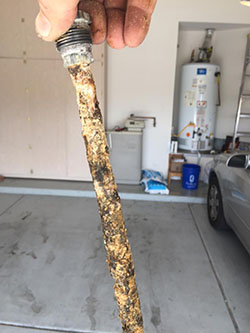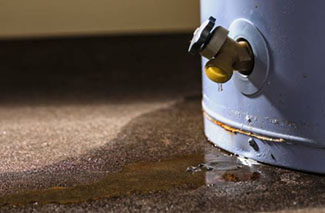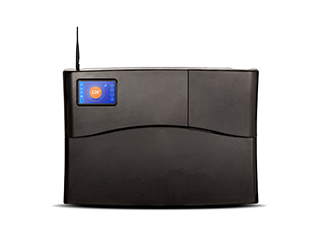Tankless Water Heaters
 08 October 2019
08 October 2019 

A Century in the Making
You rely on your water heater for all the hot water you need to cook, clean, and bathe. When you can't get any hot water or your water heater stops working, it's a major inconvenience. Not many people enjoy a cold shower.
Water heater replacement can be a time-consuming and costly endeavor. Furthermore, knowing when to replace your water heater can be difficult to gauge due to our year-round warm temperatures. The water heater is generally the first appliance that needs to be replaced in your home.
 Most people wait until their water heater fails before replacing them. It's estimated that 80 percent of all conventional tank water heaters will rupture resulting in damage.
Most people wait until their water heater fails before replacing them. It's estimated that 80 percent of all conventional tank water heaters will rupture resulting in damage.
When to Repair and When To Replace
First, you need to know the kind of water tank you have. In most cases, if it is a two-element system, and one element has gone bad, the other is not far behind. Electric elements can be replaced A misnomer is that many issues can be fixed by replacing a corroded anode rod. That's not true.
An anode rod is a steel core wire encased with aluminum, magnesium, or zinc. It is attached to the inside of the water heater to prevent the heater's lining from corroding. Over time the anode rod gets smaller, as it is supposed to do because it is keeping minerals out of the water. Delte. The anode rod should be replaced when the steel core inside reaches the thickness of a pencil. Rods cost between $20 to over $100 depending the heater.
REPAIR | Low Water Pressure:
If you are experiencing low water pressure it could be because mineral deposits have built up on the water heater pipes, which would reduce water pressure. Flush the tank to get rid of the mineral deposits.
REPLACE | Leakage:
If your water heater has been leaking, there is a good chance that is corroded and needs to be replaced. In fact, leakage is the first sign that your water heater is on the fritz and under-performing. Don't wait for the flood, which may cause damage to your floors, cabinetry and walls and create mold if not dealt with right away. It would be a good idea to have a smart leak detector on your water heater with an app to let you know there is a leak. This is especially valuable for those who are working or traveling.
REPAIR | Unusual Sounds:
 A little sound from your water heater is perfectly normal. But if you are hearing loud popping or banging, it's likely that mineral deposits have caused the water heater to overheat in order to keep the water hot. Flush the tank to rid it of the deposits.
A little sound from your water heater is perfectly normal. But if you are hearing loud popping or banging, it's likely that mineral deposits have caused the water heater to overheat in order to keep the water hot. Flush the tank to rid it of the deposits.
REPLACE | Insufficient Hot Water Supply:
It is normal for water heaters to become less efficient as they age. However, if you notice that your hot water heater is not able to produce the same amount of hot water it once did, it is time to consider your replacement options.
REPAIR | Fluctuating Water Heater:
Water temperature that fluctuates, may be an early indicator that something is wrong. Mineral deposits may have built up around your heating elements. Again, give it a royal flush.
MAINTENANCE | Draining & Flushing tank water heater
REPLACE | High Energy Costs:
Heating water is one of the largest energy expenses in your home. Once a water heater is about 10 years old, its operating efficiency can diminish by 50 percent or more. If your gas or electric bill has been creeping up as the unit ages, it's time to replace, as it will probably cost less in the long run.

Time To Replace
When it is time to replace your water heater, you may want to consider a tankless water heater instead of the convectional tank.
Tankless water heaters, also known as instantaneous, continuous flow, inline, flash, on-demand, or instant-on water heat the water only when you need it. No longer will you have a big tank full of water to keep warm when nobody's home because they don't store gallons of heated water for future use. Instead, when a faucet is turned on, the tankless water heater simply turns on a heat exchanger or heating coils as soon as it detects water flow. Once the faucet closes and the water is no longer detected, the coils automatically turn off. It only takes about five seconds for the tankless water heater to heat up water for use. If you have a teenager at home, you no longer need to worry that there will not be enough hot water left for the next shower. This system also boosts water conservation (unless. . . . you have a teenager at home).
IMPORTANT NOTE:
It is universally recommended that a whole-house water treatment system be installed. Flash-heating water causes the minerals to build up much faster than a conventional system. Without the softener, the tank's manufacturer will likely not warranty the unit.
"All over Europe and Asia, tankless water heating is a fairly common application," said Green. "However, in the past, this has been less common in the states. That is all changing."
The first tankless system was invented in 1924 by Dr. Theodor Stiebel in Berlin. Tankless systems take up considerably less space than a traditional water heater, which may be why Europe and Asia were early adopters. They started to hit the U.S. market in the 1970s. By the 1990s they were gaining momentum and now they are becoming commonplace.
"Tankless water heaters are extremely efficient – 99 percent efficient to be exact," said Green. "For every dollar you spend, 99 cents heats the water you will use. That's a $100- $140 a year energy savings over traditional tank water heaters."
Green also noted that tankless models use about 30 percent less energy than traditional water heaters.
If it's time for you to replace your water heater, consider switching to tankless.
Save Water, Save Energy, Save Money! Go Tankless!
radio podcast
Discussing heating water with the traditional tank and tankless water heaters. Tankless has become popular with hot water on demand. Explain how both work, recirculating pumps, flushing maintenance and the importance of the anode rod. Plus listener questions.
###
Photo Credits:
- Shutterstock
RELATED CONTENT:
- Blog: Tuning Up Your Toilet
- Blog: Replacing Water Supply Lines
- Blog: All About Garbage Disposals
- DIY FAQ: Water Treatment Consumer Guide
- DIY FAQ: There's a Water Heater Revolution Going On!
- Podcast: Preventing Plumbing Disasters
Print this page
recent post
- Duck, Duck, Duct! How Often Should Ductwork Be Cleaned?
- Vinyl vs. Fiberglass Windows: Which Is The Better Choice Of Replacement Window?
- We May Be The Grand Canyon State, But The Rocky Mountains Are Important For Arizona
- Welcome to Arizona! Things A Newbie to Arizona Should Know
- The Pros & Cons of Buying A Flipped House
- Getting In On The Ground Floor
- Why It’s More Critical Than Ever To Get Your AC Serviced Before Summer
- The Reality of Remodeling
- What To Look For When Comparing Your Roofing Quotes
- What To Expect When Buying New Windows & Doors
